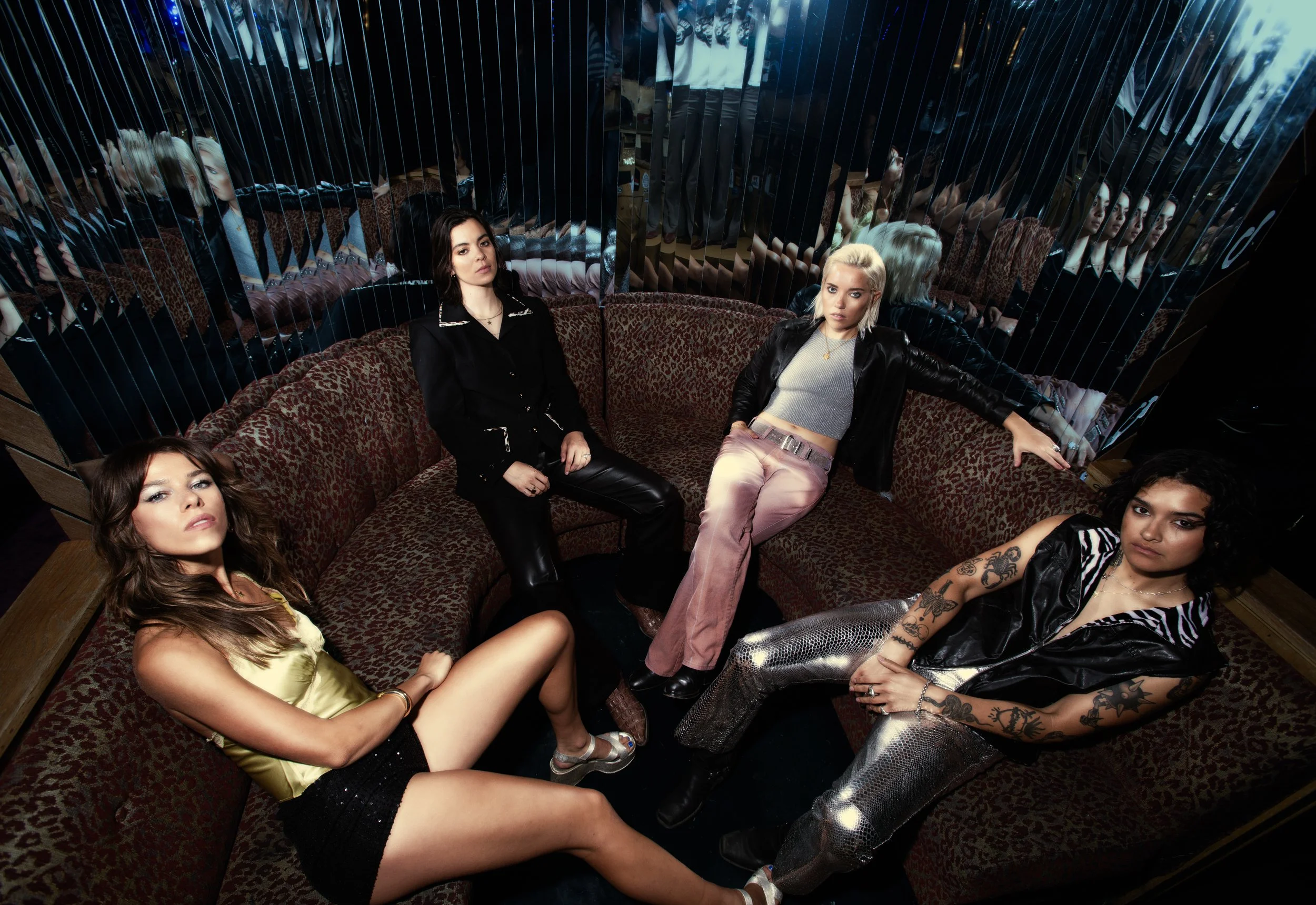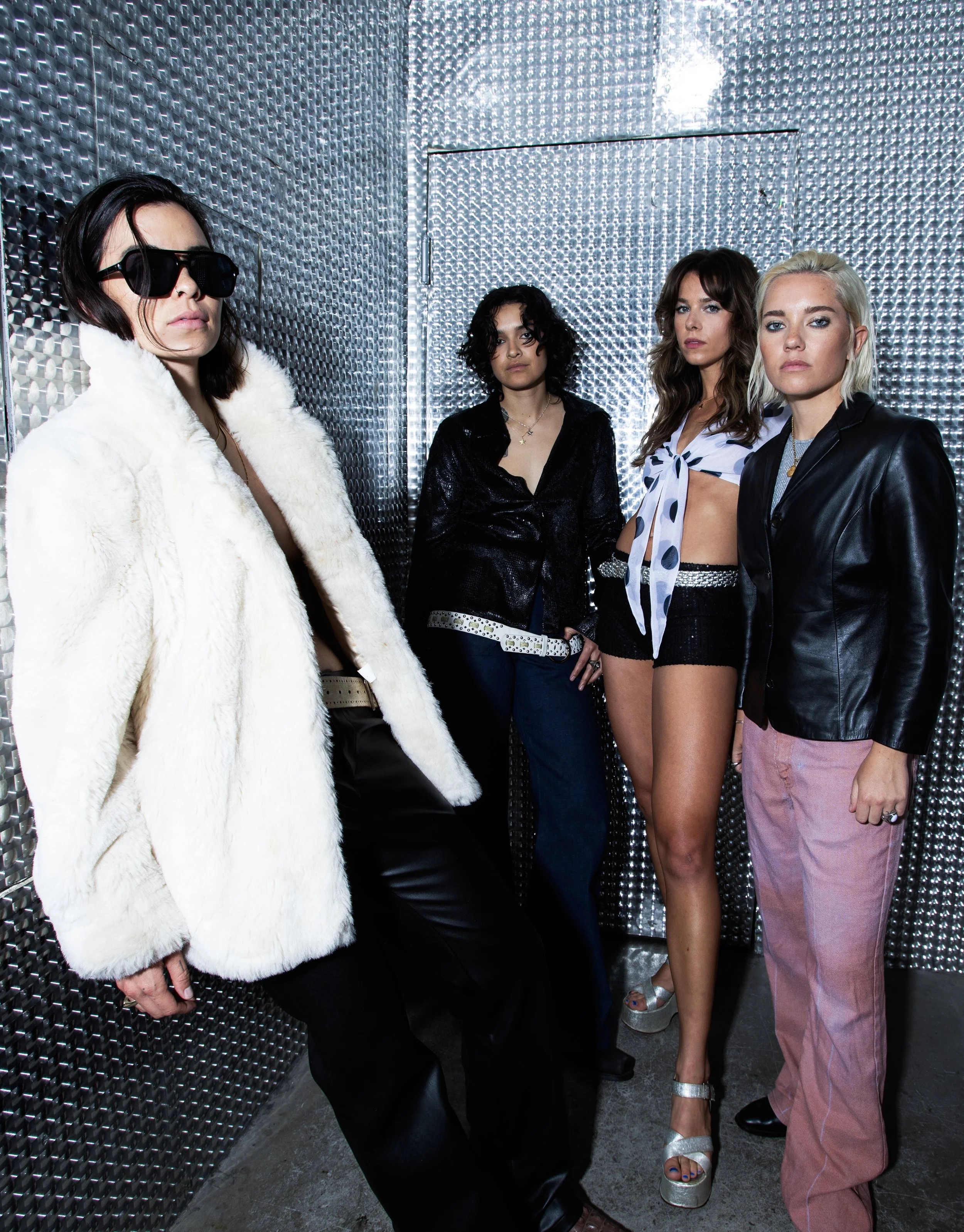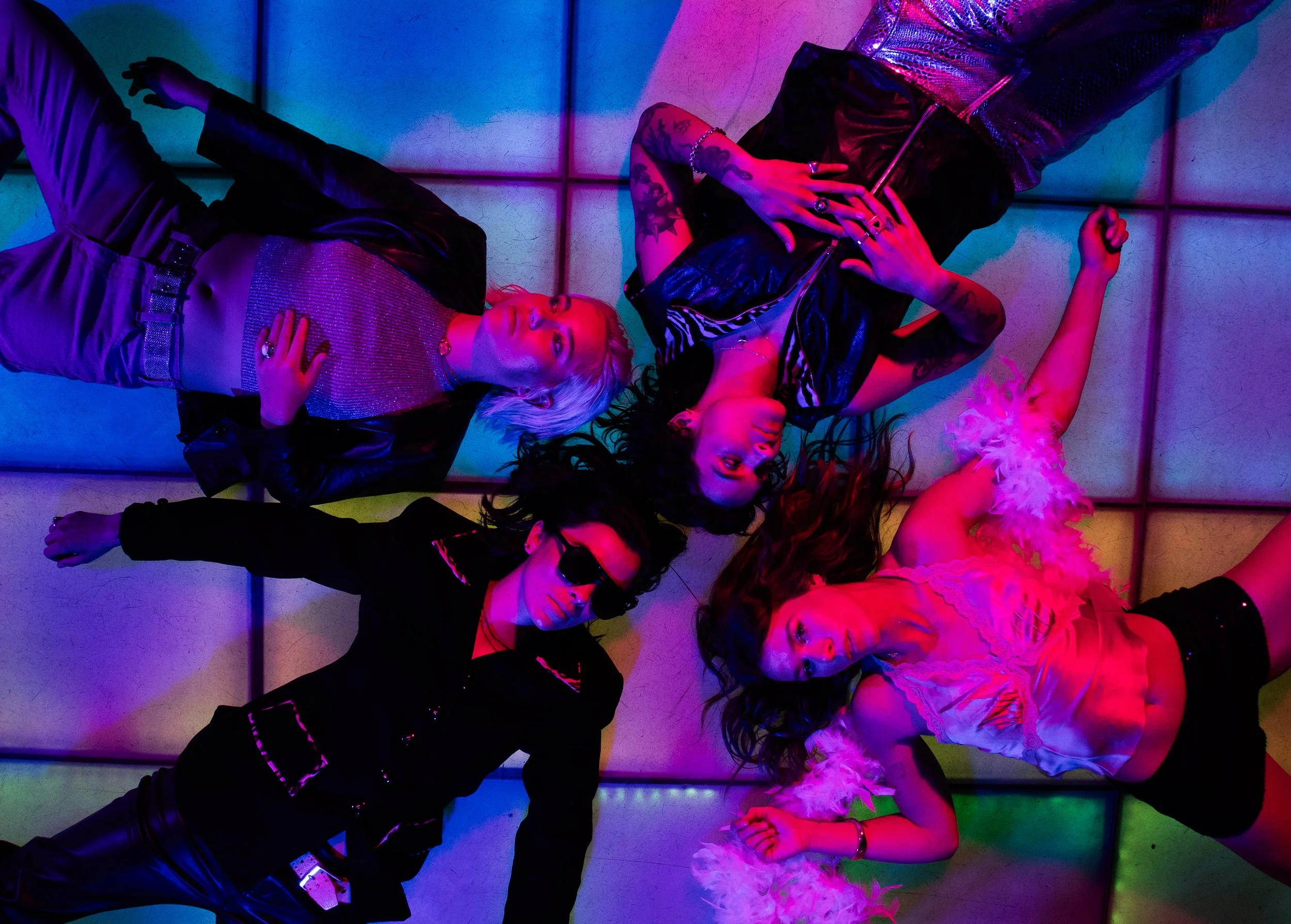The Aces on Identity, Liberation, and <em>Gold Star Baby</em>
Emerging from Orem, Utah, The Aces have spent the past decade carving out a singular space in indie pop-rock by refusing to be boxed in — whether by the reductive “girl band” label, the weight of their conservative hometown, or the industry’s expectations of what queer, Latina artists should sound like.
Sisters Alisa and Cristal Ramirez, alongside Katie Henderson and McKenna Petty, transformed the refuge of teenage jam sessions into a career defined by shimmering hooks, unapologetic self-expression, and a commitment to telling their stories on their own terms.
Across albums like When My Heart Felt Volcanic, Under My Influence, and I’ve Loved You For So Long, The Aces have built a catalog that balances vulnerability with joy, disco-laced grooves with sharp lyricism, and personal identity with collective empowerment. Their latest record, Gold Star Baby, solidifies their evolution while paying homage to the sounds and feelings that first drew fans in.
But beyond their music, The Aces’ legacy lies in their presence — queer, Latina women making space in an industry still learning how to let them exist freely.
Our publisher, Kristin Prim, recently sat down with The Aces’ lead vocalist and guitarist, Cristal Ramirez, for a candid conversation on identity, liberation, and the unapologetic spirit that fuels their latest record, Gold Star Baby.
KP: You’ve often pushed back on the idea that “girl bands” should be considered their own genre, arguing that it unfairly boxes artists in. Why do you think that label still persists in 2025, and what impact do you think it has both on the artists being labeled and on the way that audiences engage with their music?
CR: It’s tough to unwind the patriarchy in the few years since we’ve been a band — I think it’s going to take a lot of time. It affects us in so many ways where people still see us as this very one-dimensional artist, like all we have to offer is that we are women, but we’re also just people. We make music, and our music is very different from a lot of other women’s music — it’s not just a “genre.” And I think that when you box people in like that, it doesn’t grant the listener permission to form their own opinion or to see if they like that music on their own without having these preconceived notions of what it could and should be.
KP: Exactly. The enduring limitations of being a “woman artist,” right? Growing up in a conservative town in Utah, how do you feel your upbringing shaped your relationship to self-expression and creativity? Are there elements of your childhood — whether values, limitations, or experiences — that you still carry with you into your lives and music today?
CR: Absolutely — I think that music was a saving grace for all of us. It was really the place we went to not think about anything else other than being together, dreaming, and creating things. I think that growing up in Orem, Utah — a very conservative town — really gave me a lot of drive and grit because I knew that I wanted to get out and create this other life for myself; it instilled this determination in me. Feeling like I didn’t fit in and like I wasn’t meant to be there definitely carried over into my career, music, and life in so many ways. It formed a really solid determination, and I’m really grateful for that.
“It’s tough to unwind the patriarchy in the few years since we’ve been a band — I think it’s going to take a lot of time. It affects us in so many ways where people still see us as this very one-dimensional artist, like all we have to offer is that we are women, but we’re also just people.”
KP: I relate to all of that very deeply. Sometimes that’s the best drive. Three of you have come out publicly as queer, and that openness has become a visible part of your story as a band. How has living authentically impacted your lives both on and off stage, and what has that honesty taught you in your lives and relationships?
CR: I mean, I think it’s impacted everything, but at the same time, it's just the story of our lives. I think that 3 out of 4 of us are just queer people, so we’re going to write about our relationships and our love life and experiences through that lens often, you know? So it’s affected a lot; I think it’s just who we are.
KP: You’ve spoken openly about your struggles with anxiety and panic attacks, something that I relate to deeply, as I went through a very similar experience after being diagnosed with a nervous system disorder from Lyme disease in 2018. How has mental health shaped your journey with the band, and in what ways has it influenced your music or creative process?
CR: Yeah, that’s a big one. I mean, it affected it in every way possible, right? I think if you struggle with anxiety and panic, you understand how overwhelming and all-consuming it can be, but The Aces, to me, has been an anchor through that hardship. I always know that I have my band and my creativity to fall back on, to comfort me, and to bring me peace in those moments. I got so addicted to playing music as a kid because it was the only time that I wasn’t anxious — I carry that to this day. I think that's why I'm so deeply in love with making music, because it offers me this sense of peace that nothing else does.
“I think that The Aces are inherently political. I mean, I think that our very presence is political, which is a talking point in and of itself.”
KP: I understand that completely. Your latest single, “Twin Flame,” was released last month. It’s so fun; I love the vibe that you guys have been finding lately. Can you walk me through the story behind the song — what inspired it, how it came together in the studio, and what you hope listeners take away from it?
CR: It was one of the first songs that we wrote for Gold Start Baby. We didn’t even know that we were writing an album yet — we were just writing songs, as you do, you know, when you make an album. I think a lot of the time you’re not really sure you’re making an album until you are sure that you’re making an album. So it was the early, early days of writing the record, and it just came to be really quickly, in like 30 minutes! It was just really fun, and we wanted to create this really disco, dancey vibe. We wanted to kind of shake off any heaviness and just have a good time with writing again.
KP: You spoke about weaving in a strong Latin influence into “Twin Flame,” from the guitar line to the bridge in Spanish. With half of the band being Latina, how did it feel to express that part of your heritage through this song, and what was the process of bringing those cultural elements into your sound? Is that something you hope to do more of? It really works for you.
CR: That’s very, very kind. Thank you so much. Absolutely — I mean, it was such a beautiful experience to get to do that. We’ve done a lot of Spanish versions of our songs, but to have an actual song with a bridge in Spanish and a strong Latin guitar influence, it just felt amazing to embrace who you are and where you come from. Coming from where we come from — a conservative small town — it's taken longer for us to do that. Now it just feels so liberating and so beautiful to be able to be so openly proud of our heritage and to get to express it musically.
KP: I really love that. To go back to Gold Star Baby as a full record, what does this album represent for you at this stage in your career, and how does it differ — sonically, lyrically, or emotionally — from your past work?
CR: I just think that Gold Star Baby is exactly who we are right now. It feels like an album where we’re being the most present in our lives that we’ve ever been. We’re not looking back at anything; we’re just really in the moment and looking forward to the future and the excitement of that. It’s so fun to be able to make a record like that. It really is an Aces record — it sounds like our first record, our second record, and then even I’ve Loved You For So Long with a song like “Solo.” We’ve always been exploring rhythm and disco in a lot of ways, so I think that Gold Star Baby is the perfect follow-up to I’ve Loved You For So Long. We’re really, really proud of this record.
KP: Do you have a favorite track off of it?
CR: I’m going to say, “She Likes Me.”
“Keep pushing; you’re doing it. It’s coming, it’s coming down. If you don’t stop, you’ll get there, and you’ll create a life for yourself that you’re really proud of — a life that you really love.”
KP: Shifting to your impact, do you consider The Aces a political band, or do you see your presence and success itself as inherently political?
CR: I think that The Aces are inherently political. I mean, I think that our very presence is political, which is a talking point in and of itself.
KP: I’m glad that you see it that way. I think the presence of women anywhere in general today is inherently political, as sad as that is to say. If you could be remembered for one thing beyond your music, what would you want it to be?
CR: I think just for the way that we make people feel, you know? I just want to make people feel the way that Tegan and Sara or Paramore made me feel when I was 14, you know? That is my real mission in life — just to pay that back and pay that forward.
KP: What would you tell your younger selves?
CR: Keep pushing; you're doing it. It’s coming, it’s coming down. If you don’t stop, you’ll get there, and you’ll create a life for yourself that you’re really proud of — a life that you really love.
KP: What advice would you lend to women about life, work, or love?
CR: Put yourself first; take care of you. Don’t let people make you feel like your needs aren’t important and what you think and want isn’t important, because it is, so fuck ‘em.
Photography: Dana Trippe



